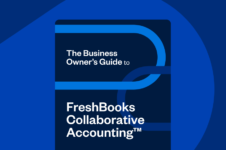Need help getting organized this tax season? Learn some effective tips from successful small business owners who have switched to FreshBooks.

Almost all successful business owners share one thing in common: As their businesses began to thrive, their accounting needs and tax prep became even more complex.
In fact, ask any small business owner about the biggest thorn in their side, and they’ll likely mention tax prep. Most services-based entrepreneurs are passionate about their businesses—but not so much about the panic and anxiety that’s associated with taxes and accounting.
So, how can business owners avoid the seasonal panic induced by tax time and enjoy peace of mind? Well, it starts with staying in control of your finances by tracking every dollar spent and keeping those day-to-day financials in order. Then, you can easily outsource the tax filing to an accounting professional.
We’ve rounded up some of the most effective and poignant advice from successful small business owners on how they save a ridiculous amount of time and make taxes stress-free with FreshBooks. Here are their best tips for optimizing your tax process and avoiding the tax-time scramble.
Table of Contents
Stay in Control of Your Financials With the Right Tools
For Damona Hoffman, a prolific dating coach and on-air personality, keeping up to date with the paper trail for her roster of contractors tends to always result in some headaches. When it comes to hunting down W-9 tax forms and 1099 forms from the businesses she contracts, life has been a lot easier with her invoices and projects now being organized and automated through FreshBooks.
“Tax season always tends to give me major anxiety,” says Damona. “Tracking my expenses and invoices in FreshBooks has saved me. To put an hour amount on it, it’s probably saved me three hours a week every time. I have about 16 bosses, so keeping track of those can get rather complicated. Invoicing quickly and having recurring clients is the biggest shortcut. ”
Sometimes, it even helps her find some unpaid invoices, too. “It just so happens that I caught a $7,000 invoice that was unpaid because I had gotten busy and wasn’t cross-referencing. When it comes to checking and rechecking, FreshBooks makes it incredibly easy to do that.”
Keep Your Books Organized and Avoid Getting Overwhelmed
Alexis Girvan keeps busy year-round with her unique business of “soul-coaching” one-on-one with clients and driving developmental work with a number of organizations globally. Every year around tax time though, Alexis admits to being overwhelmed and feeling unprepared with a nervous smile that she is used to physically crying due to being overwhelmed and feeling unprepared.
“Numbers to me, just instantly give me anxiety. I stink when it comes to tracking things and knowing what I can write off, and being able to know what category is what.”
After trying to do her taxes by herself and engaging with tax prep professionals and a CPA, she quickly felt in over her head and found herself lost in a sea of forms and paperwork.
“The first year I did my taxes, I was like a deer in headlights. When I tried FreshBooks, everything was put in categories and sorted. I very quickly started using the reporting function in FreshBooks, and that ended up being one of my saving graces for taxes in general since I could look at the whole year and categorize, itemize and sort them appropriately.”
Alexis also mentions her relationships with the real people at FreshBooks and compares it to robotic interactions she’s had elsewhere. “That personal connection and knowing a real person is actually accessible for my questions at any time has been huge. I’ve really benefited from having a personal touchpoint within the business.”
Keep Your Taxes Separate From Your Income
A classic rookie mistake for many small business owners is neglecting to set aside the right amount for taxes from every invoice. While this might be an obvious or standard practice for some, a lot of brand new small business owners, unfortunately, find this out the hard way – by coming up short at tax time and receiving a monster bill from your government.
Graphic designer Joshua Speers doesn’t leave anything to chance when it comes to ensuring he’s tax-ready. “I have three business bank accounts: a general holding account, an HST account, and an income tax account. This might seem a little extreme, but separating your money as it comes in makes it much easier at tax time.”
Consider Incorporating When It Makes Sense for Your Business
Most small business owners start out as sole proprietors. It’s the simplest way to start a business and is usually okay for one-person operations that aren’t expected to expand enormously. Income and losses will be taxed on your personal income tax return, so you need to keep careful records of what you earn and set aside money for taxes.
Other entrepreneurs choose to incorporate, which means your business is a legal entity separate from you. In addition to shielding you and your investors from personal liability, incorporating also offers tax savings in the long run.
“I incorporated my business, so I pay myself a salary as an employee and remit withholding taxes every month. It’s clean and simple, and I never have to worry about being caught short at year-end,” said Paul Russell, writer and communications consultant.
Understand Tax Obligations Anywhere You Work
Our hyper-digital world means you may have clients in far-flung corners of the globe. While this is good for business, it makes accounting a little more daunting, according to Andrew Campbell, workshop trainer and agricultural speaker.
“We work in every province [in Canada], which means a learning curve in what is taxable and what isn’t. And it’s different for different provinces. We also work in the U.S., which adds another layer of complexity,” said Campbell.
“I’ve talked to staff in finance departments in several provinces to learn what is and isn’t taxable. They can be great resources. As for the U.S., our accounting firm has experts in international tax law, which we’ve also used when needed.”
When it comes to taxes, his mantra is never to be afraid to ask an expert. “Tax law is one of the areas where it is much better to ask for permission first than for forgiveness later. They aren’t forgiving.”
Don’t Try to Do It All Yourself
With such a high volume of work coming in and more employees to manage, architect Jennifer Tully noticed that things began to slip, especially with her expense categorization during last year’s tax time.
Jennifer approached her last tax season the same way she always had by putting everything off until the end of the year. However, as her business grew, this approach proved inefficient and time-consuming.
“In the past, I have tried to do my end-of-year books for my business myself, but I don’t have an accounting degree, and I was really struggling a lot [to get] things ready for my tax accountant.”
Despite her best efforts, an expense would still end up missed or miscategorized. The result? Jennifer spent hours on end trying to figure out why her books weren’t adding up.
“Because I waited to the end [of the year], [bookkeeping] probably took [me] about 20 hours of time and a lot of frustration.”
By utilizing FreshBooks’ cloud accounting and having everything in one place, Jennifer is able to now only spend 30-60 minutes a month on bookkeeping on average, freeing up more of her time to get back to doing what she truly loves.
“Even more than the time is the confidence and the feeling that I don’t have a looming issue that’s going to hit me at the end of every tax year.”
This post was updated in January 2025.

Written by Daniel Reiter, Former Editor-in-Chief, FreshBooks
Posted on January 20, 2022

 Form 8027: Your Guide to Reporting Tip Income
Form 8027: Your Guide to Reporting Tip Income Using Student Loans to Start a Business: Is It Worth the Risk?
Using Student Loans to Start a Business: Is It Worth the Risk? Starting a Business With Student Loan Debt: Is It Possible?
Starting a Business With Student Loan Debt: Is It Possible?





